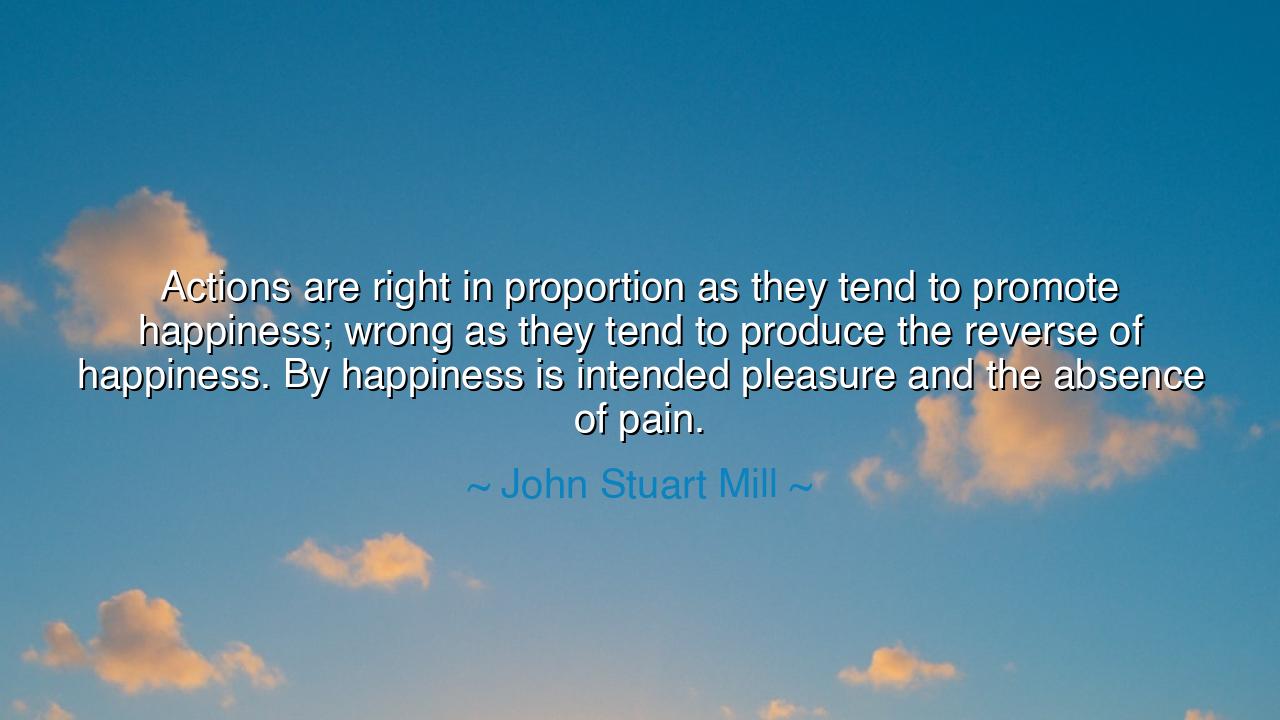
Actions are right in proportion as they tend to promote
Actions are right in proportion as they tend to promote happiness; wrong as they tend to produce the reverse of happiness. By happiness is intended pleasure and the absence of pain.






“Actions are right in proportion as they tend to promote happiness; wrong as they tend to produce the reverse of happiness. By happiness is intended pleasure and the absence of pain.” Thus declared John Stuart Mill, the philosopher of light and reason, whose mind sought to unite morality with compassion, and duty with joy. In these words, he gives voice to the principle of utilitarianism, the creed that judges human actions not by their glory, not by their tradition, but by their consequence — by whether they increase or diminish the sum of happiness in the world. It is a teaching at once simple and profound, gentle yet powerful, calling humanity to weigh every deed upon the scale of well-being.
The meaning of Mill’s wisdom is that goodness is not a matter of rigid law or sacred command alone; it is a living art, guided by the measure of its fruits. An action is right, he says, when it brings joy, comfort, and peace — when it reduces suffering and nurtures the human spirit. It is wrong when it spreads pain, fear, or misery. By grounding morality in happiness, Mill sought to free ethics from abstraction and root it in the very pulse of life. For what greater aim can there be than to lessen pain and to multiply joy? To live rightly, then, is to act as a gardener of happiness — tending one’s own and that of others, knowing that the two are intertwined like branches of the same tree.
The origin of this idea reaches deep into the soil of Western philosophy. Mill inherited it from Jeremy Bentham, his mentor, who first proclaimed that the highest good was “the greatest happiness of the greatest number.” But Mill refined it, giving it soul and nuance. He saw that happiness was not mere indulgence or fleeting pleasure, but the harmony of pleasure and virtue, the satisfaction that comes from the flourishing of human faculties — from truth, love, and justice. Thus, he transformed utilitarianism from cold calculation into a philosophy of benevolence, one that asks of every action: does this increase the well-being of living beings? Does it heal, or does it harm?
History itself bears witness to Mill’s truth. Consider the work of Florence Nightingale, who, in the midst of the Crimean War, saw the suffering of soldiers and devoted her life to the healing of others. She found joy not in comfort, but in compassion — in reducing the pain of thousands. Her actions were right not because they followed command or custom, but because they promoted happiness in its purest form: the relief of human suffering. In her life we see the living embodiment of Mill’s creed — that the morality of action is tested not by its conformity to rules, but by the measure of peace it brings to the hearts of others.
And yet, Mill’s teaching also holds warning. For to seek happiness wisely is to recognize that not all pleasures are equal. There are higher pleasures, born of intellect, love, and selflessness, and lower pleasures, which fade as quickly as they arise. True happiness, Mill says, is not the chase of appetite but the cultivation of the soul. A society that seeks pleasure without virtue will decay into chaos; but a people who pursue joy through justice and truth will rise into harmony. Thus, the absence of pain is not enough — one must also seek the presence of meaning, the fullness of life lived in alignment with goodness.
To live by this wisdom requires mindfulness in every choice. Before you act, ask yourself: will this bring more happiness or more sorrow into the world? Will it ease or burden the hearts of others? The answer may not always be clear, but the striving itself refines the conscience. For each act of kindness — each word of patience, each sacrifice for the well-being of another — adds a drop of light to the reservoir of collective joy. In this way, the ordinary becomes sacred, and daily life becomes a moral art.
The lesson, then, is this: the purpose of life is not to conquer, but to care. Not to impose one’s will, but to nurture the happiness of all beings, beginning with one’s own heart. Mill’s words are a call to conscious living — to measure success not by wealth or power, but by the good we bring to others. So, my child, live as one who adds warmth to the world. Let your actions be governed by the quiet question, “Does this heal or harm?” For in choosing to promote happiness — to lessen pain and multiply joy — you fulfill the highest law of both reason and love, and you will find that your own heart, too, becomes serene and radiant, reflecting the very light it has given.






AAdministratorAdministrator
Welcome, honored guests. Please leave a comment, we will respond soon